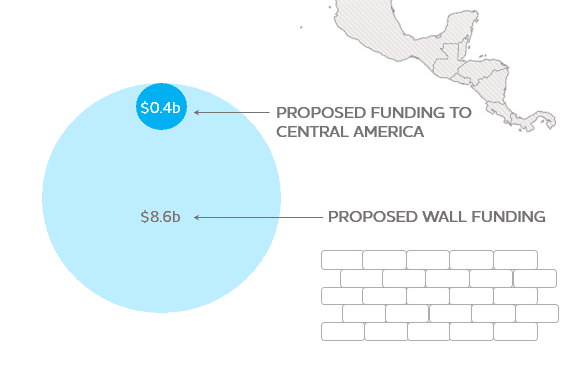On March 11 the White House released its Congressional Budget Justification for foreign assistance in Fiscal Year 2020. As in the past two years, the Trump administration proposed massive cuts to worldwide foreign aid, stifling the State Department and U.S. Agency for International Development budget by about 23 percent. Of the programs reported in the Justification, the White House is asking for a 30 percent cut in aid to Latin America through the foreign aid budget, from $1.76 billion to $1.23 billion.
Actual aid amounts will be higher, as this does not include Defense Department money and several regional funds that aren’t broken down by country. Nor does it include possible money to provide a putative post-Maduro Venezuela with aid, in the words of Deputy Secretary of State John Sullivan, “to support a democratic transition, including up to $500 million in transfer authority.”
Let’s be clear up front: these cuts will not become reality. They are suggestions to a Congress that has un-done them, on a bipartisan basis, during each of the past two years. In fact, the White House proposed slightly steeper cuts in 2017 and 2018, and Congress put nearly all the money back.
While this budget request is “dead on arrival” in Congress, we should still pay attention to it. It illustrates the Trump administration’s dark, reactive, and uncreative posture toward Latin America’s complex opportunities and challenge. Along with demonization of refugees and an obsession with border security, this budget lays bare the “America First” approach to Latin America: what would be a historic abandonment of a region beset by crises.
The Trump administration proposal would cut funding to Central America by almost 25 percent from the levels approved in 2019. Since 2015, there has been a bipartisan consensus that a robust, comprehensive aid package to Central America is key to addressing the root causes of migration. This year’s request would bring U.S. funding toward Central America down almost 60 percent since President Trump took office.
In response to the exodus of Central American families fleeing the region and requesting asylum in the United States, the president, via Twitter, has threatened to cut all forms of assistance to Guatemala, El Salvador, and Honduras. Instead of abruptly slashing aid, the U.S. government should prioritize assistance that addresses the rampant corruption, violence, economic disparity, and impunity that drive Central Americans north. U.S. assistance programs with basic oversight, working in partnership with organizations on the ground, can provide desperately needed support to build accountable institutions, workforce training, food security, crime prevention, and access to justice for victims. However, these programs will only be effective if the Trump administration reprioritizes good governance and anti-corruption efforts. Democratic governance is a critical building block for a functional and stable state, greater prosperity, and for improved citizen security. While the aid itself is slow-moving (2017 funds have just started to arrive in the region), it can complement a long term, multifaceted approach to help institutions tackle the major factors driving the mass exodus from Central America.
Instead, the administration has chosen to fund harsh border security measures, both at home and abroad, that dehumanize migrants. These policies fail to deter migration to the United States, and appeal only to those who ignore or misunderstand the root causes of migration from the Northern Triangle. The budget proposal asks for $8.6 billion to construct a wall along the border. That is 22 times the entire proposed budget for Central America.

For further information about U.S. assistance to Central America over time, see WOLA’s Central America Monitor.
The 2020 request for post-peace accord Colombia would reduce assistance less dramatically than elsewhere: by 12 percent from 2018 levels, and 18 percent from 2019 levels. The reason, though, is alarming: the Trump administration would ramp up military and police aid for forced eradication of coca, while deeply slashing economic and social assistance for affected communities.
At a time when Colombia is struggling to implement a peace accord amid a wave of Venezuelan migration, the Trump White House would cut economic aid nearly in half, from $187 million in 2018-19 to $100 million in 2020. Meanwhile, narcotics assistance (which includes a small amount of judicial aid but is mostly for the military and police) would shoot to $209 million, up from $132 million in 2018 and $159 million in 2019. Eric Ueland of the State Department’s Office of Foreign Assistance said on March 11 that this money would pay for expanded eradication by spraying herbicides from aircraft, a policy that WOLA strongly condemns, “in the event the supreme court rules and allows the government to resume aerial eradication.”
What has been an approximately 45 percent military/police aid package, known as “Peace Colombia,” would become a 65 percent military/police aid package—a proportion that recalls the more intense years of Colombia’s armed conflict. Colombia would be going back to the bad old days, despite the end of fighting with the FARC. This proposal ignores not only the need to help Colombia implement an ambitious peace accord: it ignores the poor governance and endemic poverty that have caused over 120,000 families in rural Colombia to turn, once again, to the coca plant for income.
The Trump administration would slash assistance to Mexico, to $78.9 million. That would be a 51 percent cut from 2019 levels. The administration would cut it across the board, taking about half of both economic and policing assistance. This would be a blow to U.S.-supported efforts at judicial reform, police professionalization, human rights and community-level crime prevention, but we expect Congress to reverse it.
